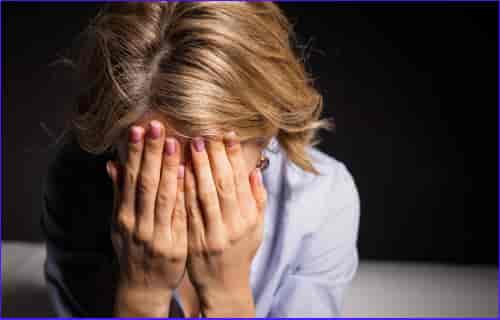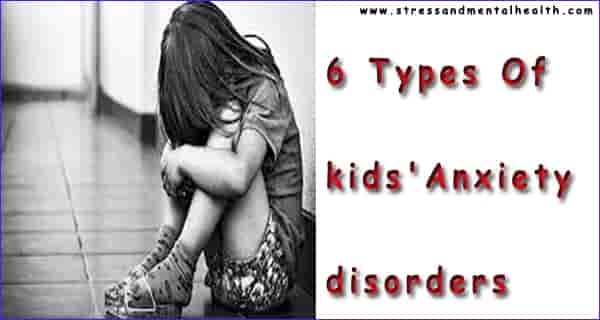“What Are 6 Types Of kids’ Anxiety Disorder: Anxiety disorders are acute fear and worry, the behavior of a child change, change in sleep habit, change in eating or change in mood. It occurs due to continues anxiety syndrome of any cause.”
8 Symptoms of anxiety in kids

Below mentioned symptoms of anxiety in kids:-
- Difficulty in concentration.
- Cannot take proper sleep during night.
- Unable to take sound sleep during the night wake up due to bad dreams.
- Kids can not eat properly.
- Kids become quickly get angry.
- kids always remain worried.
- Kids always thought negative.
- Always remain in tense and fidgety.
What Are 6 Types Of kids’ Anxiety Disorders?
There are many types of anxiety disorders in kids, such as,
1. Generalized anxiety disorder (GAD)
What Are 6 Types Of kids Anxiety Disorders? In this disorder children always remain to worry almost daily, over lots of things. Most of the kids remain worried about their homework, tests, or making mistakes.
But in the matter of generalized anxiety disorder (GAD), kids worry more and more frequently about homework, tests, and mistakes. They might also be worried about recess, lunchtime, birthday parties, playtime with friends or riding the school bus, war, weather, safety, illness, etc.
So due to the above reasons, GAD makes it hard for kind to focus in school. Because due to GAD worry almost remains in a kid’s mind. GAD makes it difficult to relax and make fun, eat well, take proper sleep at night. They do not go to school daily, miss many days. They always remain sick, tired, and afraid.
2. Separation anxiety disorder (SAD)
It happens in the case of babies and very young kids to feel anxiety when they were first time separated from their parents. But soon they get used to being with grandparents, teachers, or babysitters. Soon they feel that they are at home at a daycare center or school.
But when kids do not outgrow the fear of having apart, it is called separation anxiety disorder. Even as SAD kids get older, feel very anxious about being away from home or from their parents. They feel sick, miss school many days, cling to parents, cry or refuse to go to school. They feel trouble in sleep or sleep alone.
3. Social phobia (Social anxiety disorder)
Kids always remain afraid of what other people or children will say or think about him or them. They are always afraid they might do or say anything that makes them or her uncomfortable. They worry they might sound weird. They don’t want to come to the notice of other colleagues, so they avoid raising hands in class. Even though they are called in class, they become frozen and do not reply to any question asked by the teacher. Due to social phobia, they avoid class presentations, group activity with classmates can cause extreme fear.
Due to Social phobia kids and teenagers avoid school and friends. They feel uneasy, exhausted, or unwell before and during school. They complain about different types of body feelings and feel anxiety. They might feel that their heart is racing fast and shortage of breath not talk to anybody, hot face or feel embarrassed. They are unable to sit at rest wanted to jump, feel unstable.
4. Selective mutism (SM)
What Are 6 Types Of kids anxiety disorders? In this type of phobia, kids remain so afraid, they do not talk any bodies. They usually talk with their near and dear, at home. But they do not talk at school, with friends, or any other person at other places where they feel fear to talk.
5. Specific Phobia
What Are 6 Types Of kids’ Anxiety Disorders? Normally it happens with young kids, who feel frightened of dark, monsters, big animals, thunder, or fireworks. Mostly when kids feel afraid, their parents help to feel safe and calm. But in the case of a phobia, it is more powerful, more severe, and continuous fear of a specific thing or person or place. If a child with a specific phobia, sees a thing near him, which terrified him, he feels uncomfortable.
In the cases where the child is suffering from a specific phobia, kids may feel extreme fear from animals, spiders, shots, thunderstorms, people in different costumes, or darkness. Kids with specific phobia avoid going to such places of which they feel fear. Such as kids having a phobia of dogs avoid going to the park, friends’ house because dogs might be at that place.
6. Panic disorder
suddenly anxiety attacks cause overwhelming physical symptoms, such as feelings of shaking, trembling, increase in heart rate, difficulty in breathing. A further panic attack can occur at any time. It is more common in teens than in kids.
What are the sign and symptoms of Anxiety?
A teacher or parents can observe a sign of anxiety in kids and teenagers. such as, the kid may cling to parents, he or she may miss school or cry. Kids may act as scared or remain upset. Refuse to talk or refuse to do certain acts. It can make them afraid, worried, or nervous.
Kids or teens may feel shaky, jittery, difficulty in breathing. They may feel that butterflies are in their stomach. They feel their face very hot. Kids and teenager feels their hand clammy, dry mouth and feels that their heart is racing fast.
Kids or teens may feel shaky, jittery, difficulty in breathing. They may feel that butterflies are in their stomach. They feel their face very hot. Kids and teenager feels their hand clammy, dry mouth and feels that their heart is racing fast.
What are 3 causes of anxiety disorders?
There are many things which causes anxiety disorders, such as,
1. Genetics
There is a greater chance of anxiety in kids where a family member of kids is suffering from an anxiety disorder, Kids may get such genes inherited.
2. Brain chemistry
Genes help direct the way neurotransmitters work. Under any circumstances, if specific brain chemicals i.e.neurotransmiters are in short supply or not working well, cause anxiety.
3. Life situation
life situation is also responsible for anxiety, such as stressful events, serious illness, violence, abuse, death of a loved one.
How are anxiety disorders diagnosed: It is diagnosed by a therapist with the help of talk therapy. They talk with kids, ask questions, and listen to their answers carefully. They ask questions that at what time, circumstances kids feel anxiety. They also check the child or kids at a regular interval and give them appropriate therapy.
How are anxiety disorders treated?
Cognitive behavior therapy is used to treat anxiety disorder. It is a type of talk therapy used to manage the worry, fear, and anxiety of kids and family members. Parents are taught, how to respond when a child is anxious. Kids are taught to learn coping skills to reduce their fear and worry. The therapist helps kids to do regular practice. CBT support, kids learn how to face fears and feel better. They also feel proud of their learning. And kids started to focus on their study, game, activity in school and outside school. In some cases, medication also helps in the recovery of kids.
Read also
Frequently Asked Question about 6 types of kids anxiety
Q. What are 8 signs of anxiety in kids?
Ans. There are 8 signs of anxiety in kids,
· Difficulty in concentration.
· Cannot take proper sleep during the night.
· Unable to take sound sleep during the night wake up due to bad dreams.
· Kids cannot eat properly.
· Kids become quickly get angry.
· kids always remain worried.
· Kids always thought negative.
· Always remain intense and fidgety.
Q. At which age does anxiety usually start?
Ans. Anxiety usually starts in kids at the age of 7 years. Obsessive-compulsive disorder (OCD) and post-traumatic stress disorder are closely related to anxiety disorder.
Q. Does Childhood anxiety go away?
Ans. In most cases anxiety symptoms are common and after a disturbing experience, after passing a time most children recover from this illness.
Q. What triggers child anxiety?
Ans. Stressful happening trigger anxiety symptoms, such as serious illness, violence, death of a loved one can lead to kids become anxious.
